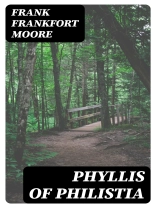‘Phyllis of Philistia’ is a masterful historical novel set in the tumultuous period of the early 20th century, weaving together themes of love, identity, and the struggle against societal constraints. Frank Frankfort Moore’s literary style is marked by rich, evocative prose that immerses the reader in the vivid settings of Philistia, employing a blend of humor and poignant social commentary. Within this narrative, Moore expertly captures the essence of a time when traditional values were being challenged, showcasing a compelling portrait of his heroine, Phyllis, who navigates the complexities of personal desire and cultural expectation. Frank Frankfort Moore, a notable English novelist and playwright of the late Victorian and Edwardian eras, drew from a diverse range of experiences that informed his writing. His close encounters with various artistic movements and his travels across Europe deeply influenced his perspectives on society, allowing him to craft narratives that expose the contradictions of his contemporaries. These influences are palpably manifested in ‘Phyllis of Philistia, ‘ where Moore infuses his characters with depth and motivation, reflecting the social upheaval of his time. I highly recommend ‘Phyllis of Philistia’ to readers who appreciate nuanced portrayals of complex characters amid historical backdrops. Moore’s exploration of the challenges faced by his protagonist resonates with themes still relevant today, making this novel a timeless reflection on the human condition. Engaging and thought-provoking, this work invites readers to reflect on their own identities while navigating the landscapes of love and societal expectation.
关于作者
Frank Frankfort Moore (1855–1931) was a prolific Irish novelist, poet, and dramatist known for his narrative proficiency and engaging plots, serving as a popular figure in late Victorian literature. Born in Limerick, he later moved to London, where he became a notable presence within literary circles. Frankfort Moore’s body of work reflects a penchant for exploring both historical themes and the complexities of contemporary society. ‘Phyllis of Philistia’ is one of Moore’s numerous novels, portraying his skill in character development and his use of satire to critique societal norms. Throughout his career, Moore authored over fifty books, including ‘The Jessamy Bride’ (1897), which exudes his fascination with historical romance, and ‘The Sale of a Soul’ (1895), which further underscores his narrative agility and insightful exploration of human experiences. His literary style often wove intricate plots with a humorous undertone, allowing readers to engage with the era’s moral and social questions. Moore’s contribution to literature is marked by an ability to capture the Victorian zeitgeist, both entertaining and informing his audience with stories juxtaposed between reality and ideals.












